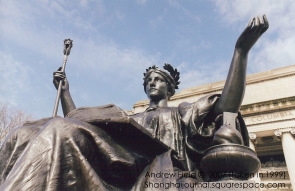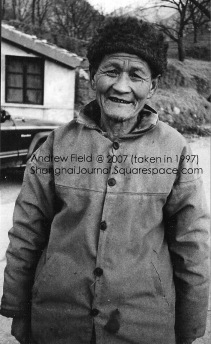Recently on H-ASIA, an interesting discussion has developed on the subject of underrepresentation of Chinese scholars in the field of history in US academia. The discussion began when two Singapore-based historians, Thomas David DuBois and Yang Bin, posted a message posing this very question. According to Dubois and Yang, the question came out of a discussion they had with their graduate students (postgrads in Aussie lingo) who noticed that there were relatively few Chinese surnames in the annual AAS meeting roster. "This prompted a discussion of how well Chinese scholars are represented in Asian studies as a whole. We encouraged our students to do a bit of checking, and they came up with some surprising -- shocking, really -- statistics. In the major research universities in the US, Chinese history is taught almost exclusively by non-Chinese. There are a number of notable exceptions to this, but the overall trend is depressingly clear."
Since then, a fair number of scholars have posted their opinions on the matter, as well as questioning whether or not this observation is accurate. Most recently, Qin Shao, a historian at The College of New Jersey, wrote that many of her Chinese colleagues had long observed that while Mainland Chinese historians are fairly well represented in small colleges and unis across the US, they are few and far between among the towering Ivies. On the representation of Chinese historians at major research universities in the West. To quote Dr. Qin:
"While Profs. DuBois and Yang Bin may be the first ones to raise the issue publicly, others have quietly noticed it for some time. Ever so observant and informed of American academic culture, the late Michigan State Univ. historian Stephen Averill and my doctoral adviser mentioned to me in the late 1990s that with only one exception (at the time), those historians who came from PRC after China’s opening and graduated from American universities had all been teaching at smaller colleges (some of them have since changed jobs), and that none of them received a job offer from the nation’s elite universities. Almost ten years have passed since then, but Prof. Averill’s observation by and large remains an accurate reflection of the reality in American colleges today."

Bob Hymes, a China historian at Columbia (and one of my former teachers) made the astute observation that at Harvard (for example) relatively few historians of any nation or region were actually from that region (although their ancestors may have been).
The Rundown on China Historians at the Ivies (East and West Coast)
Indeed, as Hymes noticed, the Harvard History Department Faculty lists three historians of China: Henrietta Harrison, Philip Kuhn, and William Kirby, all noticeably laowai.
At Columbia, my alma mater, we have Bob Hymes, Madeleine Zelin, Eugenia Lean (whom I believe is ethnic Chinese from Hong Kong), Dorothy Ko (ditto), and Adam McKeown.
Moving on to Princeton, we find Janet Chen, Benjamin Elman, Susan Naquin, and Willard Peterson. (Martin Kern doesn't appear on the history list but may be counted as well). I don't know Janet but my guess is that she grew up in America, not in Mainland China (she graduated from Williams College).
At Yale, there are Beatrice Bartlett, Ann-ping Chin (born in Taiwan), Valerie Hansen, and of course, Jonathan Spence.
U Penn has Siyen Fei (Taiwan I presume), and Arthur Waldron.
Berkeley has David Johnson, Wen-hsin Yeh (Taiwan), and Michael Nylan (who will replace the late, great Fred Wakeman remains to be seen).
Stanford has Mark Edward Lewis, Thomas Mullaney, and Matthew Sommer.
UCLA has Kathryn Bernhardt, Richard Von Glahn, and Roy Bin Wong (HK I believe).
There are other top universites that "seed" the field by producing the most outstanding PhDs, but I think I'll stop here. Sure enough, just as Qin Shao and others have observed, Mainland Chinese are not only underrepresented here, they are not represented at all.
Could this be a legacy of the Cold War?
Many scholars participating in the H-ASIA discussion have already offered their observations as to why Chinese, particularly Mainland Chinese scholars may or may not be underrepresented in US academia. I have also offered two possible issues. One is money. Another is language. As I wrote in an earlier journal entry, most people from the Mainland are from more humble family circumstances than those students coming to the US from Taiwan or Hong Kong. It is hard for them to earn fellowships, and there is far more incentive to study for more lucrative professions where jobs are more easily found (e.g. computer science or finance). Also, the language barrier is formidable. Unlike Taiwan and Hong Kong, where English language programs have been around for a long time, the Mainland has fairly recently adopted English as a second language (up through the 1980s it was Russian).
These issues aside, there is also another point to consider. The US Ivies (and here I include the West Coast Ivies) have long been bastions of Cold War politics (with Berkeley as a possible exception, though I'm not sure of this). As Harry Harootunian points out in his book _History's Disquiet: Modernity and Everyday Life_, the field of Asian Studies and institutions such as the AAS were established or developed within the framework of a post-WWII Cold War agenda. Whereas Mainland scholars might be useful in the fields of language and literature (and many scholars of literature have "dissident" sympathies), Mainland Chinese historians, schooled in the rigors of Marxist (Maoist?) historicism and sympathetic to the Chinese revolution of 1949, might constitute a threat to the anti-Communist agenda of the US government.
This of course may be a stretch, and it is hard to draw a direct connection between US policy and the hiring practices of individual universities.

I wonder if others have made similar observations. Could there be a connection between the dearth of Mainland Chinese historians in US elite institutions and the legacy of the Cold War? I leave it to others to come up with their own conclusions.
Left: Are my interests represented in the Ivies? A peasant in a village north of Beijing.